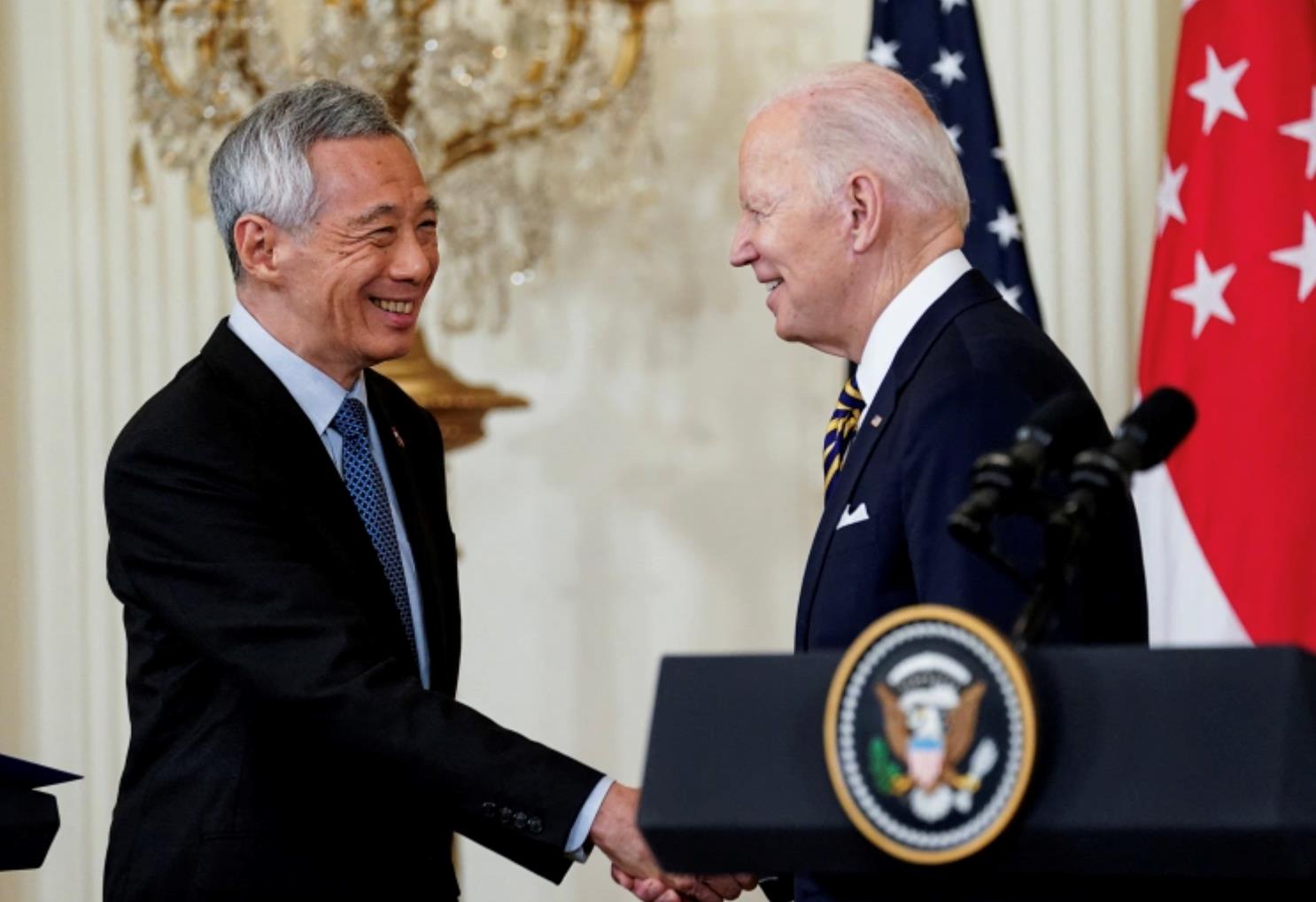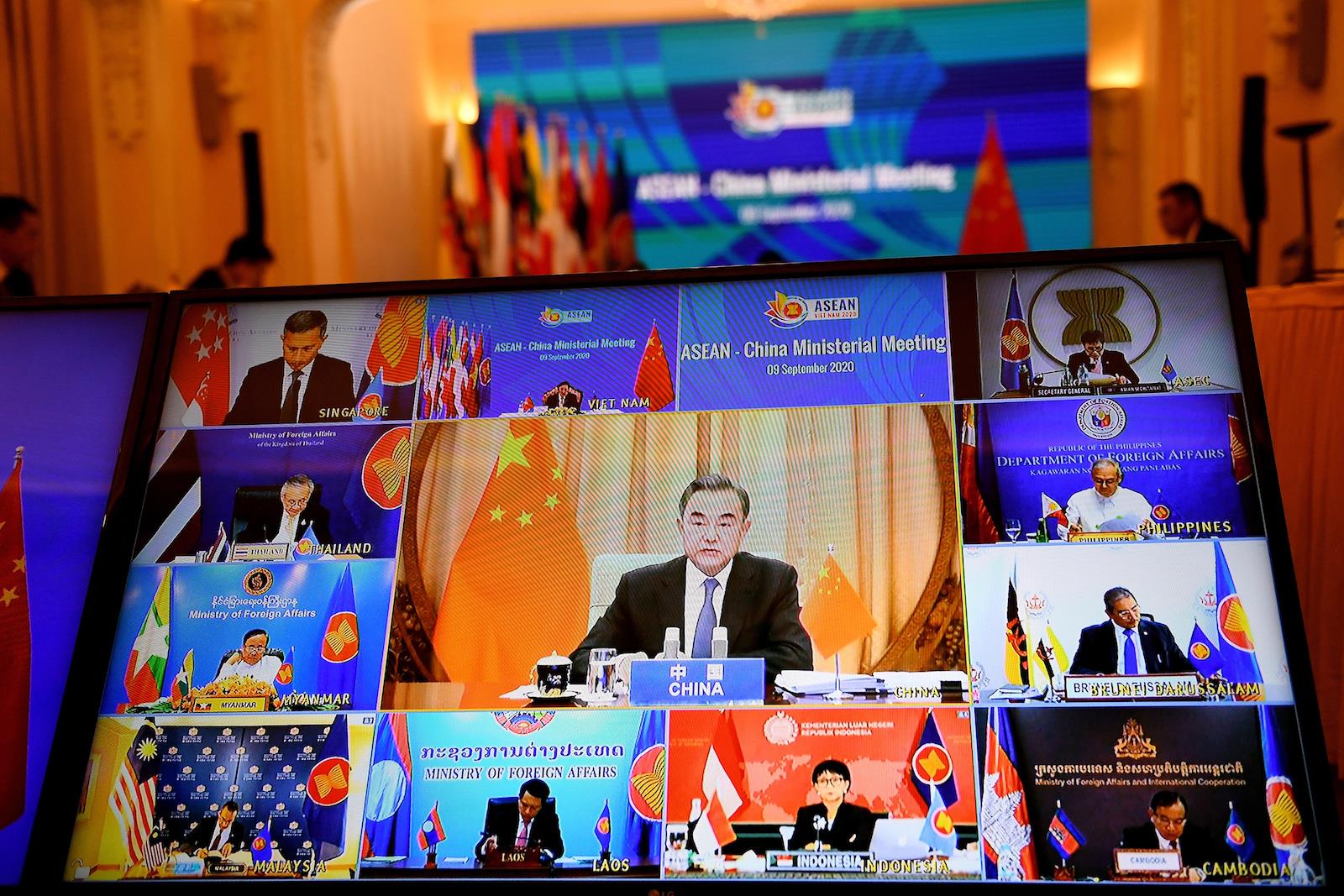(MENAFN- Asia Times)
SINGAPORE – In Washington, some label him a“Beijing whisperer.”
It's a characterization Singapore's Prime Minister Lee Hsien Loong laughed off during his recent eight-day trip to the United States, where the two nations affirmed their strong defense ties and the long-serving premier emphasized America's enduring presence as crucial to the Asia-Pacific's continued“peace, stability and prosperity.”
But it was other aspects of Lee's messaging that Chinese state media highlighted and spun, namely his call for America's leaders to engage and accommodate China – Singapore's largest trading partner –“on a win-win basis,” and to think harder about avoiding paths to a great power conflict between the world's two largest economies.
Should the US fail to heed Singapore's advice,“reality will teach it a profound lesson,” blared a recent editorial in the Chinese state-run Global Times newspaper that cited Lee's past remarks that Washington should not force Asian nations to take sides, charging that such“voices of reason” are often ignored in a bid to counter China's rise.
The publication acknowledged the wealthy city-state as having“achieved a relatively good balance between China and the US.” But a deepening global divide between so-called democratic and autocratic camps following Russia's shock invasion of Ukraine may put Singapore in greater danger of wobbling as it straddles a diplomatic tightrope.
While the island nation's decision to impose unilateral sanctions against Russia and vocal support for Ukraine has been warmly welcomed in Washington, Beijing likely views Singapore's stance as pro-Western. Despite US pressure to distance itself from the Kremlin, China has notably reaffirmed its “no limits” partnership with Russia since its invasion.
Lee told reporters during his US trip that Singapore is not choosing sides over Ukraine but is standing up for the principles of territorial integrity and sovereignty enshrined in the United Nations charter.“If [those principles are] up for grabs, then what is our basis for saying we are entitled to exist, and to security and to be safe in the world?” the premier said.
As a sovereign city-state that was once part of a larger neighbor, observers say Singapore's government is obliged to strongly reject revanchism and breaches of international rules that result in losses of sovereignty. Singapore's decision to impose sanctions against Moscow was accordingly a stronger position than any of its neighbors in the region.
Singapore typically looks to the UN to set the pace on sanctions, but it leveled financial and trade penalties on Moscow of its own volition, banning the export of goods including electronics and computers that could be used for offensive cyber operations and blocking transactions involving designated Russian banks and entities.

US President Joe Biden greets Singapore's Prime Minister Lee Hsien Loong during a joint news conference at the White House, March 29, 2022. Photo: Screengrab / CNBC
“Singapore has benefitted greatly from the existing rules-based, multilateral frameworks which Russia has violated on so many levels with its invasion of Ukraine. Ensuring the continuation of this structure is of paramount importance to a country like Singapore,” said Steven Okun, a senior advisor at trade consultancy McLarty Associates.
The island nation's punitive actions, which subsequently earned Singapore a place on a Russian government list of“unfriendly countries,” were approvingly emphasized by US Defense Secretary Lloyd Austin, who called the city-state's support for US forces“an anchor of America's presence in the Indo-Pacific” when Lee visited the Pentagon on March 28.
While not a formal treaty ally, Singapore is one of Washington's strongest security partners in Southeast Asia, hosting a logistics facility for the US navy's littoral combat ships and rotational deployments of P-8 Poseidon surveillance aircraft that ply the skies over disputed waters in the South China Sea to monitor Chinese maritime activity.
US President Joe Biden thanked Lee for“Singapore's principled leadership in supporting the people of Ukraine” when the two leaders met at the White House on March 29, describing the bilateral relationship as“close and as strong as it's ever been.” Both countries remain committed to freedom of navigation and commerce in the South China Sea, said Biden.
Lee is the first leader from the Association of Southeast Asian Nations (ASEAN) to visit the US since Biden took office. The premier's trip was scheduled within days of a proposed US-ASEAN special summit that was postponed at the eleventh hour after several Southeast Asian leaders were reportedly unable to travel to Washington.
But while Lee was in Washington, four ASEAN foreign ministers – the top diplomats of Indonesia, Thailand, the Philippines and Myanmar – visited China on separate trips. Through its warm embrace of Singapore, observers say the US had sought to telegraph its focus on what it calls the Indo-Pacific even as Washington is preoccupied with events in Europe.
Biden recommitted to implementing his administration's Indo-Pacific strategy and said he looked forward to hosting ASEAN leaders in Washington for a special summit soon. Lee told the American president that Singapore hoped the US could substantially deepen its relationships with ASEAN countries and others, namely China.
At a joint press conference, Lee said the war in Ukraine has implications across Asia because there are“potential flashpoints and contentious issues” in the region that, if poorly managed, could escalate to open conflict. He emphasized that disagreements should be settled“through peaceful means so that we can avoid making a point of no return.”
Directly addressing the fraught state of US-China relations at a dialogue hosted by the non-partisan Council on Foreign Relations think tank on March 30, Singapore's premier stressed the importance of maintaining dialogue between nations at the highest levels to avoid conflict scenarios and a“failure of deterrence.”
Lee said there is a“certain continuity in basic attitudes” towards China throughout the US“because the mutual trust and confidence is lacking,” adding he was unsure whether communication channels between the two countries“are up to the very demanding subjects which need to be discussed.”
Asia, therefore, needs institutions capable of engaging both Washington and Beijing in order to“enable an adjustment which is very difficult to make, which is how to accommodate China,” said Singapore's premier. The US needs to give thought to“[steering] things in a direction which does not lead you to a hot conflict,” he added.

China's Foreign Minister Wang Yi (C on screen) addresses counterparts from the Association of Southeast Asian Nations (ASEAN) countries in a live video conference in Hanoi on September 9, 2020. Photo: AFP / Nhac Nguyen
Lee remarked that the US would have to afford China“some space to influence the global system” given that its momentum as an increasingly developed economy is“enormous and unstoppable.” Attempting to block or hold back Beijing would result in Washington setting itself up“for a troubled relationship for a very long time to come.”
Diplomatic observers quoted in Chinese media said Lee was trying to maintain a careful balance in Singapore's relations with China and the US, and in doing so had articulated Beijing's positions to his hosts in Washington, while also dissuading Beijing from military action to solve its own disputes with Taiwan.
Lee told the Council on Foreign Relations that Russia's invasion had raised“awkward questions” for China because Moscow's actions had contravened principles of sovereignty that Beijing relies on to back up its position on Taiwan, adding that any change in the status quo for Taiwan“must not take place forcibly or non-peacefully.”
Michael Barr, associate professor of international relations at Australia's Flinders University, told Asia Times that's Singapore's response to the Ukraine crisis“is very much at odds with China's preferred course of action at every turn: in the explicit condemnation of the invasion, at the imposition of sanctions, and in the public love-in with the Americans.”
Echoing criticism sometimes voiced by Chinese scholars, Barr said Lee's preference for“a close and very public alignment with the US” had undermined an ambiguous strategy of balancing between Washington and Beijing that his father, Singapore's founding prime minister Lee Kuan Yew, had“deliberately and painstakingly” constructed.
The Australian academic stated that“China has not been pleased with Singapore since at least 2016,” during which ties between Beijing and the city-state hit an all-time low after Hong Kong authorities impounded nine Singaporean infantry carrier vehicles en route from Taiwan, which had been used in joint military exercises there.
Land-scarce Singapore has a longstanding policy of conducting military exercises in Taiwan. China returned the vehicles after two months, but the incident illustrated Beijing's irritation with Singapore. China's decision not to invite Lee to its Belt and Road Initiative (BRI) Forum in Beijing that year further underscored the diplomatic spat.
Ties between China-Singapore have bounced back in the years since, but Barr believes observers“now need to look out for fresh signs of Chinese displeasure with Singapore.” He also questioned the wisdom of Lee's calls for the US to engage China on“win-win” terms, adding that“there is basically no constituency for that objective in America.”
McLarty Associates' Okun sees things differently, telling Asia Times that he would not describe Singapore's response to Ukraine as“leaning to the West” because the rules-based international order“with respect for territorial integrity at its core is not a Western construct,” pointing to punitive measures similarly taken by Japan and South Korea.
Okun believes“there is no indication that Singapore's sanctions or vote in the UN against the Russian invasion would impact Singapore-China relations,” but added that “the balancing act for governments and global businesses alike was a challenge before the invasion. It will become even more so if sanctions extend beyond Russia.”

Russia's assault on Ukraine has put pressure on Asian nations to take sides. Photo: Sergey Mikhalchuk / Government of Ukraine
As nations in Asia face simultaneous economic and geopolitical pressures, Okun said the US now has an opportunity“to exercise principled, pragmatic, results-oriented leadership,” particularly in Southeast Asia, as the Biden administration works to“underscore the recognition of the increasing importance of ASEAN to US foreign policy.”
During his trip to Washington, Lee reiterated Singapore's consistent calls for the US to boost its economic engagement in Asia and welcomed the Biden administration's proposed Indo-Pacific Economic Framework (IPEF), which he described as“a way to engage the region and not just on strategic or security and potentially hostile basis, but on a win-win basis.”
The IPEF was first outlined in October 2021 with Asian nation representatives during the annual East Asian Summit. Details of the plan have yet to be released, though the framework reportedly aims to reduce economic security risks by rebuilding supply chains and extending support for the region's post-pandemic recovery.
Okun said the Biden administration“could have written a strategy focused on China or the global contest between democracy and autocracy,” but opted for an IPEF that“promotes an affirmative vision” for the region.“Prime Minister Lee's repeated warnings to Washington that countries in the region are not clamoring to join an anti-China bloc has sunk in.”
The McLarty Associates' advisor said the IPEF aims for new approaches to trade that meet high labor and environmental standards, shared investments in clean energy, and measures to govern digital economies and cross-border data flows according to open principles, but added that it would“ultimately disappoint if it does not result in concrete actions.”
Singapore has repeatedly encouraged Washington to refocus on Asia-oriented economic deliverables since the Donald Trump administration's withdrawal from the Trans-Pacific Partnership (TPP) pact, though domestic polarization on trade issues has kept the Biden administration from staging a return to participating in regional trade agreements.
Lee's visit saw both countries ink memoranda of understanding on infrastructure financing and development, cybersecurity cooperation and sustainable space exploration. But as the US now moves to strengthen its economic links with Asia while tightening the screws on China-aligned Moscow, Singapore's balancing act faces a stress test.
Follow Nile Bowie on Twitter at @NileBowie
MENAFN10042022000159011032ID1103987075